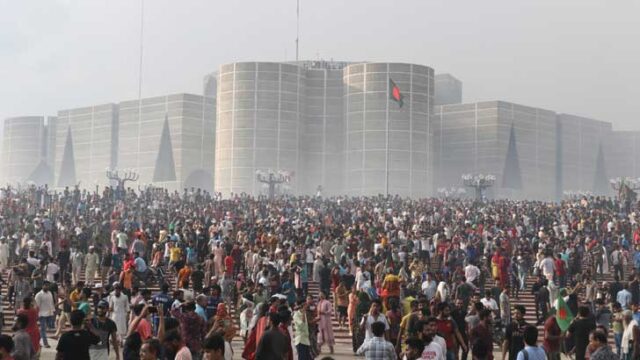Since the fall of Sheikh Hasina’s government on August 5 through a popular uprising, various political parties, organizations, and representatives of civil society have been demanding “state reform.” In this context, many are suggesting that the constitution must be amended first, while others argue that state reform is impossible without completely rewriting the constitution.
Analysts, when discussing “state reform,” point to Sheikh Hasina’s 15-year tenure as an example. They argue that Bangladesh’s current constitution grants the prime minister or head of government such powers that allow anyone in that position to become “authoritarian.” Many experts are suggesting that a Constitutional Assembly should be formed to rewrite the constitution. Among the strongest proponents of this idea is political scientist Professor Ali Riaz of Illinois State University, USA.
In an interview with BBC Bangla, Professor Riaz said, “The aspiration of this uprising is to establish a democratic system free from authoritarianism. To realize the people’s desires, the constitution needs to be rewritten.”
Amendment or Rewrite?
Some believe that reforms similar to those introduced by the military-backed caretaker government in 2007 could be applied now. However, many argue that merely patching the constitution or making legal reforms won’t prevent authoritarianism.
On the other hand, some argue that after the August 5 uprising, the government has been removed from power but a new country hasn’t been formed, so there’s no need to rewrite the constitution. Constitutional expert Shahdeen Malik believes that everything needed to build an egalitarian state already exists within the current constitution, and the present crisis can be resolved without rewriting it.
Why Is Rewriting Necessary?
Analysts point out that since Sheikh Hasina came to power in the 2009 election, her government has gradually centralized power over the past 15 years, leaning toward authoritarianism. In 2011, she abolished the caretaker government system through the 15th amendment to consolidate her authority further.
Professor Ali Riaz told BBC Bangla, “The current constitution allows for the centralization of power in a way that could enable anyone in the future to establish a personal dictatorship. This is why simply amending the constitution won’t solve the problem after an uprising like this; rewriting is necessary.”
Constitutional Risks
According to Article 7(A) of the current Bangladesh Constitution, any attempt to abrogate or suspend the constitution through force or unconstitutional means is considered treason. However, Professor Riaz argues that if a new constitution is written while keeping the old one intact and based on collective consensus, no constitutional crisis would arise.
Lawyer Hasnat Kaiyum, a senior legal figure and the chief coordinator of a movement called “State Reform Movement,” also believes that rewriting or amending the constitution requires national consensus among political parties and civil society. He says, “If all sections of society support it, there will be no crisis after the fact.”
Formation of a Constitutional Assembly
A Constitutional Assembly is a body that is tasked with drafting a nation’s constitution. After Bangladesh gained independence in 1971, the country’s first Constitutional Assembly wrote the constitution in 1972. Some analysts are now debating whether the August 5 uprising has created a similar situation that would justify forming another Constitutional Assembly.
Hasnat Kaiyum told BBC Bangla, “Since the August 5 revolution involved the participation of ordinary citizens, there should be no question about the legitimacy of a Constitutional Assembly. It could even be named the ‘Reform Constitutional Assembly.’”
Professor Riaz, however, emphasizes three approaches for constitutional reform: creating a Constitutional Assembly, preparing a draft constitution through dialogue with political parties, and holding a referendum or public hearing.
His suggestion is that, once the new constitution is finalized based on collective consensus, it should be implemented on a specific date, replacing the old one.
What’s the Issue with the Current Constitution?
After Professor Muhammad Yunus’s interim government took office on August 8, they held meetings with various political parties. In these discussions, many parties offered suggestions for state reform, with some advocating for constitutional amendments.
However, some analysts believe that the current crises in Bangladesh could be easily solved with the existing constitution and laws. Shahdeen Malik told BBC Bangla, “There are 153 articles in the Bangladesh Constitution. But no one has clearly specified which parts they want to amend and why.”
Professor Riaz disagrees, arguing that one of the main objectives of the uprising was to prevent the abuse of power. He believes that merely amending the existing constitution will not provide a sustainable solution.
Referring to the military-backed caretaker government of 2007, he said, “The reforms introduced at that time didn’t hold up in the long term. Therefore, there is no alternative to rewriting the constitution to reduce the excessive concentration of power in the hands of the prime minister.”
Most experts, however, agree that before holding any parliamentary election after the 2024 uprising, the state must undergo significant reforms to meet the demands of the people. Without such reforms, future political governments could once again walk down the path of authoritarianism.
Adopted from BBC ARTICLE










